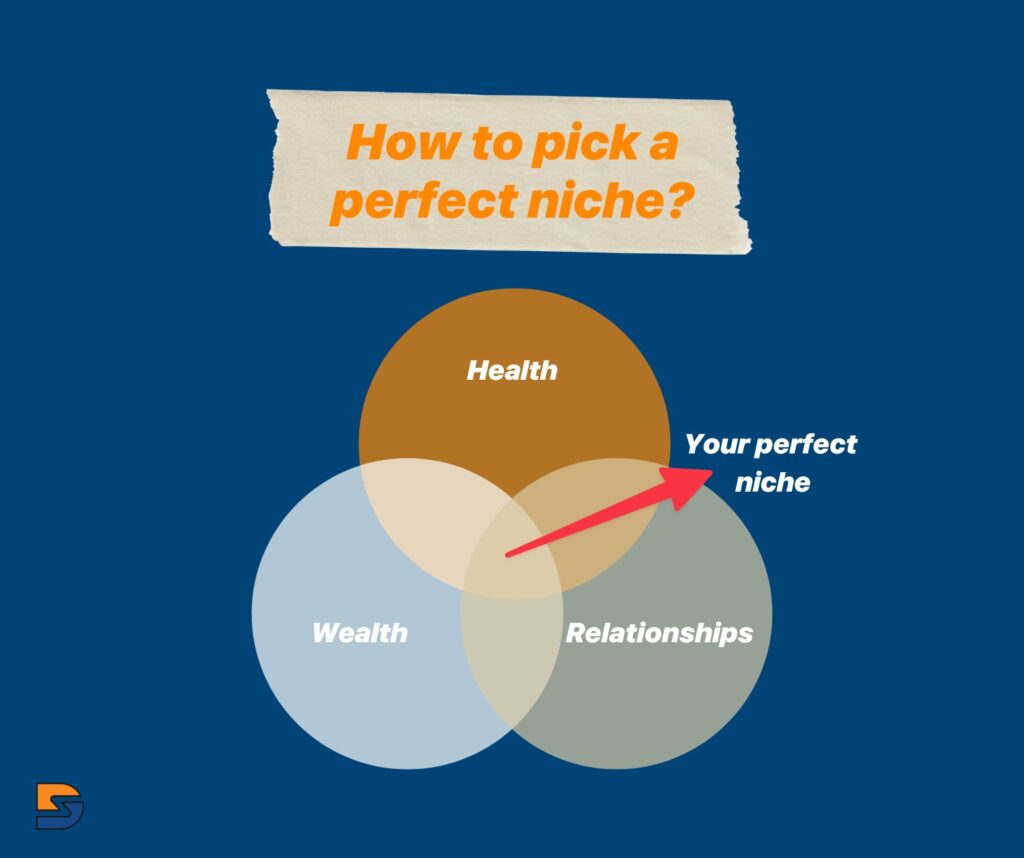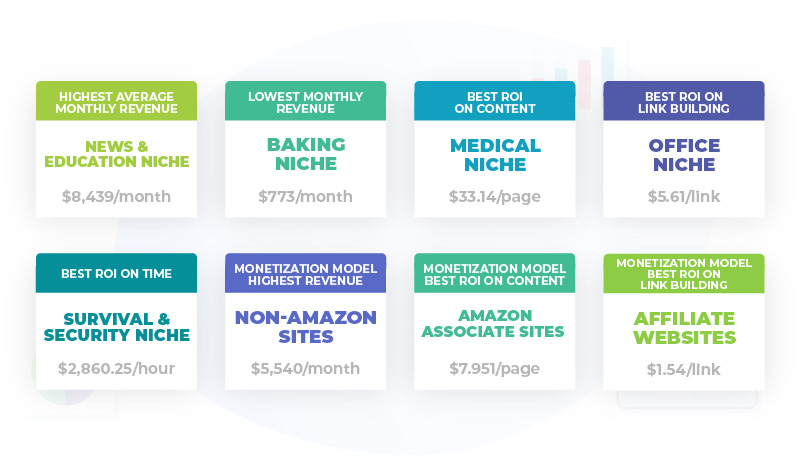1. Beginners face the big problem of choosing a niche for affiliate marketing
2. The paradox of choice and paralysis by analysis makes choosing a niche harder
3. Fear of choosing the wrong niche and lack of direction makes it difficult to start a blog
4. The best niche for affiliate marketing is the one you indulge in everyday
Starting a blog can be an exciting yet daunting journey, mainly when you aim to make money through affiliate marketing. Choosing the right blogging niche for affiliate marketing is one of your most critical decisions.
The niche you select will shape your content, attract your audience, and ultimately determine your blog’s success. But with countless options available, how do you pinpoint the best niche for affiliate marketing?
In this guide, I’ll cover the details of niche selection, offering insights and strategies to help you make an informed choice. Whether you’re passionate about health and wellness, technology, personal finance, or any other field, finding a niche that aligns with your interests and has strong market potential is critical.
We’ll explore the benefits of niche blogging, common pitfalls to avoid, and real-life examples of successful affiliate marketers who have mastered their niches.
By the end of this article, you’ll clearly understand how to identify a profitable niche that excites you and offers substantial earning potential. Let’s embark on this journey to discover the best blogging niche for affiliate marketing, setting the foundation for your blogging success.
Understanding Affiliate Marketing
What is affiliate marketing?
Affiliate marketing is a performance-based marketing strategy where individuals, known as affiliates, earn a commission by promoting products or services offered by other companies. It’s a win-win relationship: businesses gain more exposure and sales, while affiliates earn a commission for marketing those products/services.
How Affiliate Marketing Works?
The process is straightforward – An affiliate promotes a product through various channels such as blogs, social media, or email marketing. When a consumer clicks on the affiliate’s unique link and makes a purchase, the affiliate earns a commission.
This commission can be a percentage of the sale or a fixed amount. For example, if you run a blog about fitness and promote a protein supplement, you would include a particular link to the product. If a reader clicks on your link and buys the supplement, you earn a commission from that sale.
Imagine a traditional business where a retail business owner purchases sellable stock from a wholesaler/manufacturer and sells it to customers. The difference between the cost price and the selling price is the business owner’s profit. Similarly, affiliate marketers sell products to customers. Instead of buying the products, affiliate marketers link to those products.
The product owner then pays affiliate partners a commission for each sale. The commission percentage varies from product to product.
Real-Life Examples
- Pat Flynn’s Smart Passive Income: Pat Flynn is a well-known affiliate marketer who has earned substantial income by promoting products like web hosting services, online courses, and software tools on his blog Smart Passive Income. His transparent income reports and case studies provide valuable insights into successful affiliate marketing strategies.
- Michelle Schroeder-Gardner’s Making Sense of Cents: Michelle’s blog focuses on personal finance and has become a top affiliate marketing site. She shares detailed case studies on how she earns money by promoting financial products and services.
Related: Ultimate beginner’s guide on getting started with blogging on WordPress
Why Choosing the Right Niche is Crucial?
Selecting the right niche is the cornerstone of a successful affiliate marketing strategy. Your niche determines the focus of your content, the audience you attract, and, ultimately, your potential for earning. This decision can be overwhelming for beginners, but getting it right from the start is essential.
A well-chosen niche aligns with your interests and expertise and meets market demand, ensuring steady traffic and conversions. Let’s explore the importance of niche selection in affiliate marketing success, highlight common mistakes beginners make, and explain how the right niche can significantly boost your earnings.
There are only three major categories of niches that humans care about. Pick any niche, and it will fall under these three categories only.

The niche you pick should help your target audience improve their lives in strictly one of these three categories. Every human desires to have good health, wealth and relationships. Your niche should focus on only one of these three.
If you want to branch out to the other two categories, create a separate blog talking only about those categories. One blog should not target more than one category unless you’re as massive as Forbes.
With this fundamental idea set right, here are a few additional points you should consider when picking up a niche.
#1 Importance of Niche Selection in Affiliate Marketing Success
Choosing the right niche is the cornerstone of a successful affiliate marketing strategy. A well-chosen niche allows you to focus on a specific audience, making your marketing more targeted and effective. When you cater to a particular group with shared interests or needs, your content resonates more deeply, fostering trust and loyalty.
This targeted approach enhances your credibility and increases the likelihood of conversions, as your audience is more likely to find your recommendations relevant and valuable.
#2 Common Mistakes Beginners Make When Choosing a Niche?
Many beginners fall into several traps when selecting a niche, which can hinder their success:
- Following Trends Blindly: Chasing after the latest trends without considering long-term viability can lead to short-lived success. Trends can fade quickly, leaving your blog without a sustainable audience.
- Ignoring Personal Interest: Choosing a niche solely based on profitability without any personal interest can lead to burnout. Maintaining consistent, high-quality content becomes challenging if you’re not passionate about the topic.
- Overlooking Market Research: Failing to conduct thorough market research can result in selecting a niche with either too much competition or insufficient demand. Understanding the market landscape is crucial for identifying opportunities and gaps.
- Too Broad or Too Narrow: Selecting a niche that’s too broad can make it difficult to stand out, while a niche that’s too narrow might not attract enough audience. Finding the right balance is key.
#3 How Can the Right Niche Lead to Higher Conversions and Earnings?
The right niche can significantly boost your conversions and earnings in several ways:
- Targeted Audience: A well-defined niche attracts a specific audience that is more likely to be interested in your content and recommendations. This targeted traffic is more likely to convert into sales.
- Higher Engagement: Engagement levels increase when your content addresses your audience’s needs and interests. Higher engagement often translates to higher trust, which is crucial for affiliate marketing success.
- Better SEO Performance: Focusing on a niche allows you to optimize your content for specific keywords, improving your search engine rankings. Higher visibility in search results drives more organic traffic to your site.
- Authority and Trust: Consistently providing valuable content within a niche helps establish you as an authority. When your audience trusts your expertise, they are likelier to follow your recommendations and purchase through your affiliate links.
- Monetization Opportunities: A well-chosen niche often has multiple monetization opportunities, such as sponsored posts, product reviews, and exclusive brand deals. These additional revenue streams can significantly boost your earnings.
Related: Claim your free domain from Bluehost
Best Niche for Affiliate Marketing [Stats]

To make sure you choose the right niche based on data, I found this post from Matt Diggity that studied more than 300 affiliate sites. The data found in this study will blow your mind, but here are key stats you should be aware of.
- Health and Wellness: This niche has a high average commission rate of 8.7% and a conversion rate of 13.2%. It is among the most profitable niches due to the high demand for health-related products and services.
- Finance: The finance niche boasts an impressive average commission rate of 9.9% and % conversion rate of 11.3%. This niche includes sub-niches like personal finance, investing, and credit cards, which are highly lucrative.
- Technology: With an average commission rate of 5.6% and a conversion rate of 10.1%, the technology niche remains a strong contender. This includes gadgets, software, and tech reviews.
- Lifestyle: This niche has an average commission rate of 6.3% and a conversion rate of 9.8%. It covers various topics, including travel, fashion, and home decor.
- Pet Care: The pet care niche has an average commission rate of 7.2% and a conversion rate of 12.1%. This niche is snowballing as more people are willing to spend on their pets.
- Personal Development: This niche has an average commission rate of 8.1% and a conversion rate of 10.5%. It includes areas like self-improvement, productivity, and mental health.
These statistics highlight the profitability and potential of various niches in affiliate marketing, making them excellent choices for bloggers looking to maximize their earnings.
Related: Tips for creating conversion-optimized content
Choosing a Profitable Niche
#1 Passion and interest: Why you should choose a niche you are passionate about
Choosing a niche you are passionate about is crucial for several reasons. First, it keeps you motivated. Blogging and affiliate marketing require consistent effort; it can quickly become a chore if you’re not genuinely interested in your niche. When you care about the topic, creating content feels less like work and more like sharing something you love.
For example, if you’re passionate about gardening, writing about different plants, gardening techniques, and tools will come naturally to you. Your enthusiasm will shine through your content, making it more engaging and authentic. Readers can sense when someone is genuinely interested in what they’re talking about, which builds trust and loyalty.
Moreover, being passionate about your niche means you likely have some existing knowledge or experience, which can help you create high-quality, informative content. This expertise can set you apart from others who might be in it just for the money.
#2 Market demand: How to research and identify high-demand niches?
Identifying a niche with high market demand is essential for attracting a steady stream of visitors to your blog. Start using tools like Google Trends to see what people are searching for. This tool shows you the popularity of search terms over time, helping you spot rising trends. Another method is to use keyword research tools like Ahrefs or SEMrush.
These tools can show how many people search for specific terms each month. Look for keywords with a high search volume but moderate competition. This indicates interest in the topic, but it’s not so saturated that you can’t compete.
You can also check out forums, social media groups, and Q&A sites like Quora. See what questions people are asking and what problems they’re trying to solve. This can give you insights into what kind of content people are looking for and whether there’s a demand for it.
#3 Competition analysis: Finding a balance between competition and opportunity
When choosing a niche, it’s crucial to balance competition and opportunity. Too much competition can make it hard to stand out, but no competition might mean no demand. Start by identifying your potential competitors. Search for your niche keywords and see what comes up. Look at the top-ranking blogs and websites.
Analyze their content, design, and engagement. Are they well-established with many followers, or are they smaller sites? Next, look for gaps in the market. Are there subtopics within your niche that are underserved? For example, if your niche is fitness, you might find a lot of content about general fitness but not much about fitness for seniors. This could be an opportunity to carve out a space for yourself.
Also, the quality of the competition should be considered. If the top sites are well-established but their content is outdated or not very good, you might be able to provide better, more up-to-date information.
#4 Profitability: Evaluating the earning potential of a niche
Evaluating a niche’s earning potential involves examining how you can monetize your blog. Start by researching affiliate programs related to your niche. Look at the commission rates and the types of products or services you can promote.
High-ticket items or recurring subscription services can be particularly lucrative. Check out what other bloggers in your niche are doing. Are they running ads, offering sponsored posts, or selling their products? This can give you an idea of the available revenue streams.
Consider the audience’s purchasing power. A niche like luxury travel might have fewer readers, but those readers will likely spend more money. On the other hand, a niche like budget cooking might have a larger audience, but they might not spend as much.
Finally, think about the long-term potential. Some niches might be trendy and profitable now but could fade away. Others, like health and wellness, have enduring appeal and can provide a steady income over time.
Related: Top 2 Google Domains alternatives
Getting Started with Blogging
When you’re just starting, you cannot have too many options that distract you from your primary goal. The first step of successful blogging is understanding who you’re targeting & your core strengths.
Knowing this very clearly will make all the subsequent steps easily doable.
When you’re just starting, you can begin with Bluehost. It’s an affordable, trustworthy, and beginner-friendly web hosting solution that you can use.
If you don’t want to spend money immediately, you can explore writing platforms like Medium. Once you developed a writing style and created a system for writing effortlessly, you can switch to setting up your blog.
The problem with Medium is growing on your own is extremely difficult. You have to publish your stories to a publication, and the distribution network of that publication will bring attention to your content.
The organic distribution is the toughest nut to crack if you’re starting on Medium.
If you want to start blogging with complete control, check out this Bluehost review to make better decisions.
Ready to Start Niche Blogging for Affiliate Marketing?
This post aims to help beginners pick a profitable, sustainable, and in-demand niche. The biggest mistake beginners make is choosing a blogging niche solely based on profitability. I made the same mistake at the beginning of my career. It took me half a decade to realize and fix this mistake.
I created a blog in a profitable niche but failed big time since I wasn’t actively participating. To make a profit, you need to build trust, and for that, you need authority. Authority is a product of getting involved daily and being known for one thing.
If you keep switching blogging niches, you’d be good at nothing.
I’ll make it super simple – Ask yourself this question when picking up a niche: “Can I do this even if I don’t get paid for it?” If the answer is yes, that’s the niche you should pick. Everything else will fall in place. You can fool an algorithm to get traffic, but you can’t fool yourself into pursuing a niche that doesn’t resonate with you.

